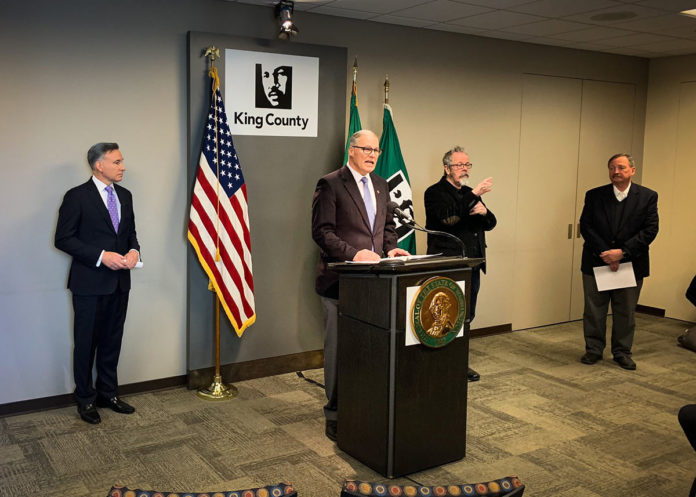
Vancouver residents may be scrambling to find toilet paper and cleaning supplies as Washington state continues to take action against coronavirus – but as schools, bars, restaurants and events shut down, bigger economic problems also loom for local businesses.
Jennifer Baker, president of the Columbia River Economic Development Council (CREDC), said so far about 50% of the businesses that responded to a new survey from the group reported that they are already seeing an economic impact from the virus. And, while the situation is still very fluid and hard to fully comprehend, it’s likely that tourism, hospitality and even industrial sectors will continue to feel the pain from reduced international trade and travel.
“In the survey, about half said their companies had not had significant impacts at this time, but the other 50% said they are experiencing significant impacts,” Baker said. “We’re seeing supply chain blockages, difficulty in being able to ship or receive certain products. Customers are also starting to show more conservative ordering patterns.”
Several industrial items are produced in China – things like plastics, chemical compounds used for medicine and electronic components. The shutdown of the Chinese economy has rippled through the product chain globally and locally.
Consumers are also nervous, and as school shutdowns, restaurant shutdowns and event cancellations continue, their purchasing patterns are likely to shrink.
“Because the health situation is still evolving, it will be hard to ballpark what the longer-term economic impact will be,” Baker said. “We already had a few companies report six figures worth of economic damage in one week.”
CREDC used the first survey last week to ensure that Clark County could participate in emergency Small Business Administration loan funding assistance through the state. The group is planning to release a larger survey this week, in hopes of getting a better picture of the potential damage so it can pass it along for more funding, Baker said.
“The more information we can get from companies willing to share what they’re experiencing, the more resources we’ll get by sharing those stories,” Baker said. “We need to be able to share the tale of the broader impact.”
Cliff Myers, president and CEO of Visit Vancouver USA said the local tourism industry is also starting to feel the pinch. Event cancellations – like that of the Spring Vancouver Brewfest – are starting to affect hotel reservations, which have been down over the last month or so.
“Hotels are seeing cancellations of events, although most are just postponed for now, reservations are down and overall this amounts to a lower level of economic activity here if there are less people doing business,” Myers said.
The notion of social distancing and preventing large public gatherings is a bit antithetical for the tourism industry, with its job of encouraging travel to Vancouver. But Myers said there are other in-house things that his group plans to work on if other activity slows, such as cleaning up the database or assessing promotional materials.
“Our job is to encourage travel to Vancouver and Greater Clark County and now we’re in a mode where we should not be encouraging that,” Myers said. “We’re doing what we can to support local businesses and suggesting some outdoor activities, but frankly even that may change compared to where we are now. The situation is very fluid.”
The Port of Vancouver USA has also seen a slowdown in some international trade, said Ryan Hart, a spokesman for the Port.
“We’ve seen a slowdown of exports for agriculture and mineral bulks, but we’re countering that with other things like wind energy components,” Hart said.
The Port has about 3,000 wind energy components scheduled to move through its facilities in coming months, and that should insulate it some from the other economic uncertainties, he said.
“Everything seems to be changing daily,” Hart said. “Everybody seems to be in wait-and-see mode. But we will continue to assess the situation daily on the commercial side, and on the side of our employees, as things evolve.”
Statewide, the worst hit areas economically so far are in King, Pierce and Snohomish counties where school shutdowns and event cancellations have been in place the longest, said Jillian Henze, a spokeswoman for the Washington Hospitality Association.
“At a state level we’re seeing counties with stricter health recommendations having a larger and significant impact on businesses.” Henze said. “In the Seattle area, some businesses are shutting down because they can’t sustain operations right now. But in Spokane, where there haven’t been any cases, people are nervous but mostly going about their business.”
A ban on non-essential travel for government workers is also having an impact on hotels in the state, she said.
“We’re seeing the impact much more in the counties around Seattle, but every corner of Washington state is being impacted by this,” Henze said.
Restaurants, bars CLOSE
The evening of Sunday, March 15, Washington Gov. Jay Inslee released a statement saying that he would sign a statewide emergency proclamation on March 16 to temporarily shut down restaurants, bars and entertainment and recreational facilities. Restaurants are still allowed to provide take-out and delivery services, but no in-person dining is permitted.
Inslee also announced that all gatherings with more than 50 participants are prohibited and all gatherings of fewer than 50 participants are prohibited unless previously announced criteria for public health and social distancing are met.
Numerous restaurants around Clark County took to social media on March 16 to let the public know that they would be continuing to offer take-out and/or delivery.



